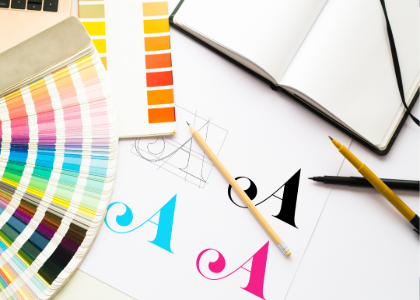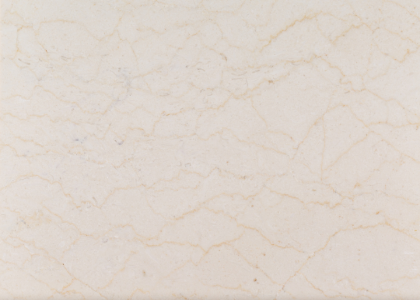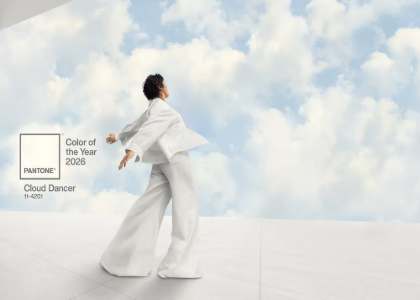Blog

Why You Should Choose a Serif Font for Your Logo
You probably already know how important it is to choose the right components for your logo, from the color palette to the font. As far as typography is concerned, you may have noticed that many companies are now opting for sans-serif fonts. But why not take the opportunity to use a serif font for your logo? Let's take a closer look.
What is a serif font and typeface?
What is difference between serif and sans serif?
Before we start explaining why you should choose a serif font, what are its characteristics? How do they differ from sans-serif fonts?
A serif font, also known as a serif, is a font whose letters have small lines added at each end, the whole of which forms an imaginary line. They have been used for a very long time, especially in printed documents such as books. It's also one of the font types used to create logos, especially corporate logos. On its parts, sans-serif fonts do not have these small lines added at each end. It’s one of the font types used to create logos, particularly corporate logos.
What are the advantages of using a serif font for your logo?
Now, why should you choose a serif font? We've come up with five advantages you shouldn't overlook, especially if you want to give your brand image a touch of credibility. You can incorporate this typography into your logo, but also into the titles and texts on your website.
It adds a serious touch to your logo
First, serif fonts have the advantage of being considered more serious. This is why companies working in fields such as law or finance choose this typeface. If you want to show that you're a credible company or expert, you may want to opt for a serif font. For example, Wells Fargo and HSBC, two banks, have chosen serif fonts for their logos.
This can give the impression that your company has been around for a long time.
On the other hand, as serif fonts have been used for a long time, it can give the impression that your company is mature. If you're just starting out and want to increase your credibility, using a serif font for your logo could help. Among the long-established companies that still use serif fonts for their logos, we can name Tiffany's and Coach.
You're targeting a high-end customer base
Similarly, serif fonts have the advantage of being considered more upscale than sans serif fonts. This can be particularly helpful if you're selling more luxurious products or services. Indeed, even today, many luxury brands such as Dior or Rolex opt for serif fonts, so why not you?
They are easier to read
Do you know why serif fonts are used in books? Simply because the lines at the end of each letter make it easier to follow. So if your company name or slogan is long, a serif font might make it easier to read. Additionally, you should use a serif font on your official documents, such as contracts or invoices, especially if they contain a lot of text.
They seem to be less widely used than sans serif fonts
Finally, if the latest logo redesigns are anything to go by, the trend is to use simple, sans-serif fonts. But why not take the opportunity to do the opposite? If everyone else chooses a sans-serif font, you could choose a serif font to stand out from the crowd —just make sure it aligns with the rest of your brand image and logo design. Trends evolve rapidly.
Some examples of good modern and classic serif fonts
Let us prove to you that there are some wonderful serif fonts you can use when creating your logo. In theory, it's not just serious or boring companies that choose this type of font - on the contrary.
So here are five interesting serif fonts style you will find on the FreeLogoDesign editor. We have over 200 fonts available in this tool!
Bree Serif
Let’s start with Bree Serif. The pronounced serifs are reminiscent of geometric shapes. There’s a sense of stability and solidity. Although serif fonts are considered more traditional, Bree Serif has a modern look.
Caligosta
Caligosta, on the other hand, has less pronounced serifs, but is very elegant and modern, while being a little thicker. Perfect if you want to give your logo a more elegant or feminine touch.
Holtwood One
Some serif fonts are only available in uppercase, like Holtwood One. If you want a logo with thick letters that won't go unnoticed, this font is for you.
Playfair Display
If, on the other hand, you want something more refined and serious, you could choose a font like Playfair Display. It's a timeless classic, one of the best-known serif fonts.
Trocchi
Who says serif fonts can't be fun or full of personality? Trocchi is a good example of a font that is both entertaining and stylish. The serifs give a touch of solidity, but also of refinement.
Is Times New Roman a serif font?
Indeed, one of the most common serif font is Times New Roman. This typography is mainly used with long texts, whether printing press, documents or books. Since it is very used, we do not recommend using this font when creating your logo, especially when there are many serif font options.
In conclusion, as we've seen, there are many serif fonts that can give your logo many effects and looks. There are also many advantages to choosing them, especially if you want to emphasize your seriousness or professionalism. If you want to create a logo for a luxury product, this is an avenue not to be overlooked!
More tips and tricks on the blog


